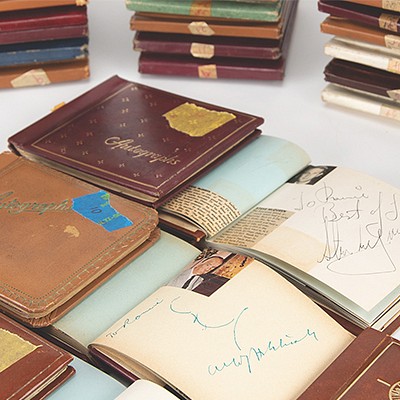Victor Hugo: Juliette Drouet Autograph Letter Signed
Two ways to bid:
- Leave a max absentee bid and the platform will bid on your behalf up to your maximum bid during the live auction.
- Bid live during the auction and your bids will be submitted real-time to the auctioneer.
Bid Increments
| Price | Bid Increment |
|---|---|
| $0 | $5 |
| $50 | $10 |
| $200 | $25 |
| $500 | $50 |
About Auction
Aug 16, 2023
RR Auction's August Fine Autographs and Artifacts sale brings nearly 750 lots to the auction block, with a special focus on the collection of Dr. Charles Ronald Bauer—an in-person collector who focused on entertainment's elite. RR Auction support@rrauction.com
- Lot Description
French actress (1806-1883) who abandoned her career after becoming the mistress of Victor Hugo, to whom she acted as a secretary and traveling companion. ALS in French, signed “Je l'aime mon Victor, je t'adore mon sublime bien aime, Juliette [I love you my Victor, I adore you, my sublime beloved, Juliette],” four pages on two adjoining sheets, 5.25 x 8.25, March 28, [1847]. Handwritten letter to illustrious French writer Victor Hugo by his lifetime lover, allowing one to glimpse their daily life and bearing witness to Juliette Drouet’s amorous devotion. In part (translated): "I am waiting for you, my dear beloved, with the softest, the most tender and the best of what I have inside me. If you do not hurry to come, my poor little man, I shall almost not be able to see you of the entire day, for you know that on Sunday you go back even sooner than usual, and that you do not come back during the night. I am very worried, for I see the minutes and the hours follow one another, and you are not coming. O, should my heart be able to push your legs and control them, you would be quite soon next to me. Where are you, my Toto, and what are you doing? Are you thinking of me? Are you desiring me, and do you love me a little? What a consolation it would be for me if I were certain that you are thinking of me, that you miss me and that you love me as I am certain that you are the best, the most noble and the most generous of all men, excepting your genius. Unfortunately, all these lovely qualities are as many veils which hide the true state of your heart. Should you not love me anymore, you would be all the more devoted to me, more excellent and more careful to hide it from me, fearing, well-foundedly, that I should become desperate. I know that and it makes me love you even more, although it does not reassure me." In very good to fine condition, with overall creasing.
Drouet’s letters to Victor Hugo form one of the most beautiful correspondences of French literature. While most of them are held at the French National Library, a small portion of them have remained in private hands. Although Drouet’s unique figure has traditionally been somewhat overshadowed by Hugo’s, interest in her has steadily increased in recent years. Her role has been reassessed and she is now recognized as a prominent feminine figure of 19th century France. On the literary side, apart from providing constant support to copy Hugo’s texts—which she mentions in the offered letter—she is known to have saved his manuscripts when the writer had to leave France after Napoleon III’s coup in December 1851. - Shipping Info
-
Bidder is liable for shipping and handling and providing accurate information as to shipping or delivery locations and arranging for such. RR Auction is unable to combine purchases from other auctions or affiliates into one package for shipping purposes. Lots won will be shipped in a commercially reasonable time after payment in good funds for the merchandise and the shipping fees are received or credit extended, except when third-party shipment occurs. Bidder agrees that service and handling charges related to shipping items which are not pre-paid may be charged to a credit card on file with RR Auction. Successful international Bidders shall provide written shipping instructions, including specified Customs declarations, to RR Auction for any lots to be delivered outside of the United States. NOTE: Declaration value shall be the item’(s) hammer price and RR Auction shall use the correct harmonized code for the lot. Domestic Bidders on lots designated for third-party shipment must designate the common carrier, accept risk of loss, and prepay shipping costs.
-
- Buyer's Premium



 EUR
EUR CAD
CAD AUD
AUD GBP
GBP MXN
MXN HKD
HKD CNY
CNY MYR
MYR SEK
SEK SGD
SGD CHF
CHF THB
THB













